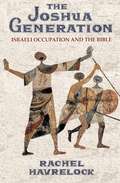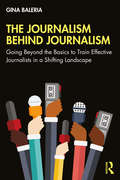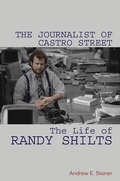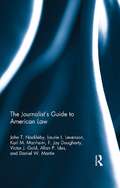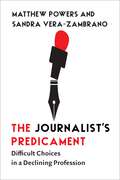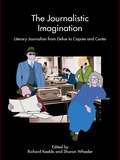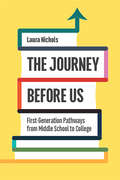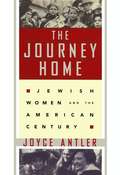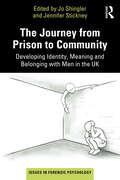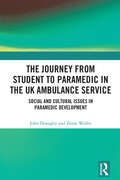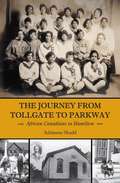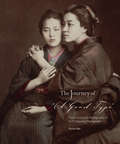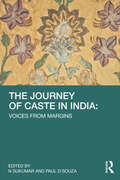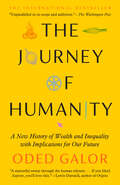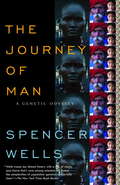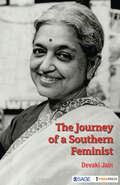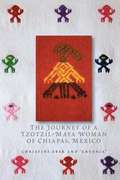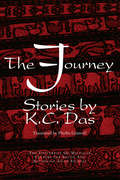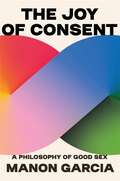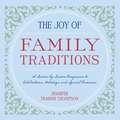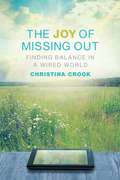- Table View
- List View
The Joshua Generation: Israeli Occupation and the Bible
by Rachel HavrelockHow a controversial biblical tale of conquest and genocide became a founding story of modern IsraelNo biblical text has been more central to the politics of modern Israel than the book of Joshua. Named after a military leader who became the successor to Moses, it depicts the march of the ancient Israelites into Canaan, describing how they subjugated and massacred the indigenous peoples. The Joshua Generation examines the book's centrality to the Israeli occupation today, revealing why nationalist longing and social reality are tragically out of sync in the Promised Land.Though the book of Joshua was largely ignored and reviled by diaspora Jews, the leaders of modern Israel have invoked it to promote national cohesion. Critics of occupation, meanwhile, have denounced it as a book that celebrates genocide. Rachel Havrelock looks at the composition of Joshua, showing how it reflected the fractious nature of ancient Israelite society and a desire to unify the populace under a strong monarchy. She describes how David Ben-Gurion, Israel's first prime minister, convened a study group at his home in the late 1950s, where generals, politicians, and professors reformulated the story of Israel's founding in the language of Joshua. Havrelock traces how Ben-Gurion used a brutal tale of conquest to unite an immigrant population of Jews of different ethnicities and backgrounds, casting modern Israelis and Palestinians as latter-day Israelites and Canaanites.Providing an alternative reading of Joshua, The Joshua Generation finds evidence of a decentralized society composed of tribes, clans, and woman-run households, one with relevance to today when diverse peoples share the dwindling resources of a scarred land.
The Journalism Behind Journalism: Going Beyond the Basics to Train Effective Journalists in a Shifting Landscape
by Gina BaleriaToday’s journalists need to know both the skills of how to write, interview, and research, as well as skills that are often thought of as more intangible. This book provides a practical, how-to approach for developing, honing, and practicing the intangible skills critical to strong journalism. Individual chapters introduce journalism’s intangible concepts such as curiosity, empathy, implicit bias, community engagement, and tenacity, relating them to solid journalistic practice through real-world examples. Case studies and interviews with industry professionals help to further establish connections between concept and practice, and mid-chapter and end-of-chapter exercises give the reader a concrete pathway toward developing these skills. The book offers an important perspective for the modern media landscape, where any journalist seeking to make an impact must know how to contextualize events, hold power to account, and inform their community to contribute to a healthy democracy. This is an invaluable text for courses in journalism skills at both the undergraduate and graduate level and anyone training the next generation of journalists.
The Journalist of Castro Street: The Life of Randy Shilts
by Andrew E StonerAs the acclaimed author of And the Band Played On, Randy Shilts became the country's most recognized voice on the HIV/AIDS epidemic. His success emerged from a relentless work ethic and strong belief in the power of journalism to help mainstream society understand not just the rising tide of HIV/AIDS but gay culture and liberation.In-depth and dramatic, Andrew E. Stoner's biography follows the remarkable life of the brash, pioneering journalist. Shilts's reporting on AIDS in San Francisco broke barriers even as other gay writers and activists ridiculed his overtures to the mainstream and labeled him a traitor to the movement, charges the combative Shilts forcefully answered. Behind the scenes, Shilts overcame career-threatening struggles with alcohol and substance abuse to achieve the notoriety he had always sought, while the HIV infection he had purposely kept hidden began to take his life.Filled with new insights and fascinating detail, The Journalist of Castro Street reveals the historic work and passionate humanity of the legendary investigative reporter and author.
The Journalist's Guide to American Law
by Victor J. Gold Allan Ides John T. Nockleby Laurie L. Levenson Karl M. Manheim F. Jay Dougherty Daniel W. MartinThis easy-to-use guidebook offers an overview of American law that should find a place on the desk of any journalism student or professional journalist. The Journalist’s Guide to American Law provides an overview of major legal principles and issues in practical terms for journalists covering any aspect of the legal system. The book’s organization captures both the bird’s-eye view of the subject and offers an easy reference guide when the professional needs to understand a distinct legal concept. The areas covered range from professional concerns such as the First Amendment, cameras in the courtroom, Sunshine laws, and access to government documents to general legal matters such as the institutions of law and the lawmaking function of the judiciary, core constitutional principles such as separation of powers and judicial review, and the day-to-day functioning of courts. Equally at home on the desk of the general assignment reporter or the legal correspondent, as well as their producers and editors, the book equips the journalist with the knowledge required to translate complex legal notions into plain English.
The Journalist's Predicament: Difficult Choices in a Declining Profession
by Matthew Powers Sandra Vera-ZambranoLow pay. Uncertain work prospects. Diminished prestige. Why would anyone still want be a journalist? Drawing on in-depth interviews in France and the United States, Matthew Powers and Sandra Vera-Zambrano explore the ways individuals come to believe that journalism is a worthy pursuit—and how that conviction is managed and sometimes dissolves amid the profession’s ongoing upheavals.For many people, journalism represents a job that is interesting and substantial, with opportunities for expression, a sense of self-fulfillment, and a connection to broader social values. By distilling complex ideas, holding the powerful to account, and revealing hidden realities, journalists play a crucial role in helping audiences make sense of the world. Experiences in the profession, though, are often far more disappointing. Many find themselves doing tasks that bear little relation to what attracted them initially or are frustrated by institutions privileging what sells over what informs. The imbalance between the profession’s economic woes and its social importance threatens to erode individuals’ beliefs that journalism remains a worthwhile pursuit. Powers and Vera-Zambrano emphasize that, as with many seemingly individual choices, social factors—class, gender, education, and race—shape how journalists make sense of their profession and whether or not they remain in it.An in-depth story of one profession under pressure, The Journalist’s Predicament uncovers tensions that also confront other socially important jobs like teaching, nursing, and caretaking.
The Journalistic Imagination: Literary Journalists from Defoe to Capote and Carter
by Richard Keeble Sharon WheelerFocusing on the neglected journalism of writers more famous for their novels or plays, this new book explores the specific functions of journalism within the public sphere, and celebrate the literary qualities of journalism as a genre. Key features include: an international focus taking in writers from the UK, the USA and France essays featuring a range of extremely popular writers (such as Dickens, Orwell, Angela Carter, Truman Capote) and approaches them from distinctly original angles. Each chapter begins with a concise biography to help contextualise the the journalist in question and includes references and suggested further reading for students. Any student or teacher of journalism or media studies will want to add this book to their reading list.
The Journey Before Us: First-Generation Pathways from Middle School to College (Critical Issues in American Education)
by Laura NicholsMore students are enrolling in college than ever before in U.S. history. Yet, many never graduate. In The Journey Before Us, Laura Nichols examines why this is by sharing the experiences of aspiring first-generation college students as they move from middle-school to young adulthood. By following the educational trajectories and transitions of Latinx, mainly second-generation immigrant students and analyzing national data, Nichols explores the different paths that students take and the factors that make a difference. The interconnected role of schools, neighborhoods, policy, employment, advocates, identity, social class, and family reveal what must change to address the “college completion crisis.” Appropriate for anyone wanting to understand their own educational journey as well as students, teachers, counselors, school administrators, scholars, and policymakers, The Journey Before Us outlines what is needed so that education can once again be a means of social mobility for those who would be the first in their families to graduate from college.
The Journey Home: How Jewish Women Shaped Modern America
by Joyce AntlerIn recent decades, prominent American Jewish women like Bella Abzug and Betty Friedan have made headlines and history, challenging the constraints facing women in American public life. Few realize that these women embody a hundred-year legacy of remarkable activism. From suffrage to birth control, from trade unionism to higher education, from civil rights to feminism to every aspect of popular culture, Jewish women have been in the vanguard, leading key social movements and shaping cultural consciousness.
The Journey from Prison to Community: Developing Identity, Meaning and Belonging with Men in the UK
by Jo Shingler Jennifer StickneyThe Journey from Prison to Community: Developing Identity, Meaning and Belonging with Men in the UK provides a practical guide for practitioners working with men to successfully make the transition between prison and the community. This transition presents significant challenges, especially for those who have served many years in prison; for those who have experienced multiple cycles of release/recall; for those whose personality traits make it harder for them to build relationships and cope with strong emotions; and for those whose lives have been characterised by trauma, chaos, crime and institutionalisation. Drawing on the authors' clinical expertise and the lived experiences of real service-users, alongside the latest research in the field, the book identifies key issues in transition and explores the impact of these issues. Crucially, it provides guidance, tools and support to professionals working with men in the UK to build a crime-free, socially integrated and meaningful life after incarceration, featuring real-life stories of those who have made the transition. This is an essential read for professionals working in a range of settings across prison and community environments, while the wide variety of professional experience represented in the book broadens its appeal to forensic and clinical psychologists, occupational therapists, probation officers, prison staff and those working in the third sector. It is also valuable resource for qualified professionals, those in training, support roles, and managers involved in planning strategy and service delivery.
The Journey from Student to Paramedic in the UK Ambulance Service: Social and Cultural issues in Paramedic Development
by Diane Waller John DonaghyDrawing on extensive ethnographic research, this fascinating book highlights the challenges and contradictions faced by neophyte paramedics as they transition from a classroom setting into day-to-day clinical work placements.Shining a spotlight on the subculture of the UK Ambulance Service, as well as the paramedic profession more widely, it examines critically how language, cultural meanings, institutionalised rules, professional identity, and working practices determine key behaviours within paramedic practice, providing readers with insight into the profession not seen by members of the public or portrayed by media representations. The book draws on work of seminal authors and experts in the field to provide a sociological perspective on this not only challenging but also, at times, chaotic professional environment.Supported by fieldnotes as well as interviews with students and paramedics, the book will be essential reading for any student on the path to becoming a paramedic. It will also be valuable reading for those within the service who wish to better understand the hidden cultural and social components that lie beneath the practice itself.
The Journey from Tollgate to Parkway: African Canadians in Hamilton
by Adrienne ShaddWhen the Lincoln Alexander Parkway was named, it was a triumph not only for this distinguished Canadian but for all African Canadians. The Journey from Tollgate to Parkway looks at the history of blacks in the Ancaster-Burlington-Hamilton area, their long struggle for justice and equality in education and opportunity, and their achievements, presented in a fascinating and meticulously researched historical narrative. Although popular wisdom suggests that blacks first came via the Underground Railroad, the possibility that slaves owned by early settlers were part of the initial community, then known as the "Head of the Lake," is explored. Adrienne Shadd’s original research offers new insights into urban black history, filling in gaps on the background of families and individuals who are very much part of the history of this region, while also exploding stereotypes, such as that of the uneducated, low-income early black Hamiltonian.
The Journey of "A Good Type": From Artistry to Ethnography in Early Japanese Photographs
by David OdoWhen Japan opened its doors to the West in the 1860s, delicately hand-tinted photographic prints of Japanese people and landscapes were among its earliest and most popular exports. David Odo studies the collection of Japanese photographs at Harvard’s Peabody Museum and the ways they were produced, acquired, and circulated in the nineteenth century.
The Journey of Caste in India: Voices from Margins
by N. Sukumar and Paul D’SouzaThis book provides a comprehensive overview of caste in contemporary India. With contributions from scholars like Valerian Rodrigues, B. B. Mohanty, Surinder Jodhka, Anand Teltumbde, etc. It discusses wide-ranging themes like the trajectory of caste in post-independence India; Dalits and cultural identity; the paradox of being a Dalit woman; caste violence and social mobility; Ambedkar’s quest for the right of social equality; social security for inclusive development of Dalits; discrimination and exclusion of Dalits in education; and Dalit merit and institutional injustice, and presents an overview of the struggles for distributive justice in India. This volume will be of importance to scholars and researchers of Dalit studies, social justice, exclusion studies, caste studies, affirmative action, political studies, sociology, social anthropology, and South Asian politics.
The Journey of Caste in India: Voices from Margins
by N. Sukumar and Paul D’SouzaThis book provides a comprehensive overview of caste in contemporary India. With contributions from scholars like Valerian Rodrigues, B.B. Mohanty, Surinder Jodhka, and Anand Teltumbde, it discusses wide-ranging themes like the trajectory of caste in post-independence India; Dalits and cultural identity; the paradox of being a Dalit woman; caste violence and social mobility; Ambedkar’s quest for the right of social equality; social security for the inclusive development of Dalits; discrimination and exclusion of Dalits in education; and Dalit merit and institutional injustice, and presents an overview of the struggles for distributive justice in India.This volume will be of importance to scholars and researchers of Dalit studies, social justice, exclusion studies, caste studies, affirmative action, political studies, sociology, social anthropology, and South Asian politics.
The Journey of Humanity: The Origins of Wealth and Inequality
by Oded GalorA landmark, radically uplifting account of our species' progress from one of the world's pre-eminent thinkers - with breakthrough insights into the power of diversity and our capacity to tackle climate change. 'Completely brilliant and utterly original ... a book for our epoch' Jon Snow, former presenter Channel 4 News 'Astounding in scope and insight ... provides the keys to the betterment of our species' Nouriel Roubini, author of Crisis Economics 'A masterful sweep through the human odyssey ... if you liked Sapiens, you'll love this' Lewis Dartnell, author of OriginsIn a captivating journey from the dawn of human existence to the present, world-renowned economist and thinker Oded Galor offers an intriguing solution to two of humanity&’s great mysteries. Why are humans the only species to have escaped - only very recently - the subsistence trap, allowing us to enjoy a standard of living that vastly exceeds all others? And why have we progressed so unequally around the world, resulting in the great disparities between nations that exist today? Immense in scope and packed with astounding connections, Galor's gripping narrative explains how technology, population size, and adaptation led to a stunning &“phase change&” in the human story a mere two hundred years ago. But by tracing that same journey back in time and peeling away the layers of influence - colonialism, political institutions, societal structure, culture - he arrives also at an explanation of inequality's ultimate causes: those ancestral populations that enjoyed fruitful geographical characteristics and rich diversity were set on the path to prosperity, while those that lacked it were disadvantaged in ways still echoed today. As we face ecological crisis across the globe, The Journey of Humanity is a book of urgent truths and enduring relevance, with lessons that are both hopeful and profound: gender equality, investment in education, and balancing diversity with social cohesion are the keys not only to our species&’ thriving, but to its survival.
The Journey of Man: A Genetic Odyssey
by Spencer WellsAround 60,000 years ago, a man--genetically identical to us--lived in Africa. Every person alive today is descended from him. How did this real-life Adam wind up as the father of us all? What happened to the descendants of other men who lived at the same time? And why, if modern humans share a single prehistoric ancestor, do we come in so many sizes, shapes, and races?<P> Examining the hidden secrets of human evolution in our genetic code, Spencer Wells reveals how developments in the revolutionary science of population genetics have made it possible to create a family tree for the whole of humanity. Replete with marvelous anecdotes and remarkable information, from the truth about the real Adam and Eve to the way differing racial types emerged, The Journey of Man is an enthralling, epic tour through the history and development of early humankind.
The Journey of Man: A Genetic Odyssey
by Spencer WellsAround 60,000 years ago, a man—genetically identical to us—lived in Africa. Every person alive today is descended from him. How did this real-life Adam wind up as the father of us all? What happened to the descendants of other men who lived at the same time? And why, if modern humans share a single prehistoric ancestor, do we come in so many sizes, shapes, and races?Examining the hidden secrets of human evolution in our genetic code, Spencer Wells reveals how developments in the revolutionary science of population genetics have made it possible to create a family tree for the whole of humanity. Replete with marvelous anecdotes and remarkable information, from the truth about the real Adam and Eve to the way differing racial types emerged, The Journey of Man is an enthralling, epic tour through the history and development of early humankind.
The Journey of Man: A Genetic Odyssey
by Spencer WellsAround 60,000 years ago, a man—genetically identical to us—lived in Africa. Every person alive today is descended from him. How did this real-life Adam wind up as the father of us all? What happened to the descendants of other men who lived at the same time? And why, if modern humans share a single prehistoric ancestor, do we come in so many sizes, shapes, and races?Examining the hidden secrets of human evolution in our genetic code, Spencer Wells reveals how developments in the revolutionary science of population genetics have made it possible to create a family tree for the whole of humanity. Replete with marvelous anecdotes and remarkable information, from the truth about the real Adam and Eve to the way differing racial types emerged, The Journey of Man is an enthralling, epic tour through the history and development of early humankind.
The Journey of a Southern Feminist
by Devaki JainThis book is a collection of Devaki Jain’s writings and lectures related to the women’s movement in India and interventions in policy and fact base drawn from that experience. A journey of over six decades, it presents important interventions in the design of national and international development policy. Beginning with a fascinating account of Jain’s own evolution into a feminist, each chapter starts with an introductory note locating it in her own professional journey. The initial chapters of the book underline an important fact—better understood now but a radical intervention when Jain wrote it—that women’s reasoning and the ideas that emerge from their lived experience need to be converted into macro frameworks of development. The later chapters champion the role of local power, in economic planning led by women, in healing inequalities. They also pose a feminist challenge to inherited knowledge usually created and argued for by men. In her most recent work, Jain reiterates that poor women’s struggles, strategies and needs should inform development strategy at the local level. At a global level, she talks of how women and their networks in the South are offering ideas on rethinking development.
The Journey of a Tzotzil-Maya Woman of Chiapas, Mexico
by Christine Eber AntoniaMost recent books about Chiapas, Mexico, focus on political conflicts and the indigenous movement for human rights at the macro level. None has explored those conflicts and struggles in-depth through an individual woman's life story. The Journey of a Tzotzil-Maya Woman of Chiapas, Mexico now offers that perspective in one woman's own words. Anthropologist Christine Eber met "Antonia" in 1986 and has followed her life's journey ever since. In this book, they recount Antonia's life story and also reflect on challenges and rewards they have experienced in working together, offering insight into the role of friendship in anthropological research, as well as into the transnational movement of solidarity with the indigenous people of Chiapas that began with the Zapatista uprising. Antonia was born in 1962 in San Pedro Chenalhó, a Tzotzil-Maya township in highland Chiapas. Her story begins with memories of childhood and progresses to young adulthood, when Antonia began working with women in her community to form weaving cooperatives while also becoming involved in the Word of God, the progressive Catholic movement known elsewhere as Liberation Theology. In 1994, as a wife and mother of six children, she joined a support base for the Zapatista Army of National Liberation. Recounting her experiences in these three interwoven movements, Antonia offers a vivid and nuanced picture of working for social justice while trying to remain true to her people's traditions.
The Journey: Japanese Americans, Racism, and Renewal
by Sheila HamanakaText and photographed details of a mural depict the history of the Japanese people in America.
The Journey: Stories by K. C. Das (Michigan Papers On South And Southeast Asia #48)
by K. C. DasK. C. Das is deservedly one of the most celebrated writers in India today. He writes primarily in Oriya, the language of his native state of Orissa, where he was born in 1924. A civil servant by profession, Das pursued a second career as a writer of stories, poems, and essays. The stories in this collection take place in an urban setting. The characters are mainly middle class, making them more accessible to North American readers than other examples of contemporary Indian fiction. These are not simple stories. They are about “divides,” about gaps between realities and imagination. In complex shifts between direct dialogue, interior monologue, and interior or imagined dialogue, Das lovingly but mercilessly exposes his characters' thoughts, self-deceptions, and the games they play with each other. These are stories about human weaknesses, the fallibility of human relationships, and the strategies we adopt to cope with our failures. They are about coming to terms with unpleasant, sometimes shocking truths about ourselves and others.
The Joy of Consent: A Philosophy of Good Sex
by Manon Garcia“From the bedroom to the classroom to the courtroom, ‘consent’ is a key term in our contemporary sexual ethics. In this timely reexamination, Manon Garcia deftly reveals the hidden complexities of consent and proposes how to reconceptualize it as a tool of liberation.”—Amia Srinivasan, author of The Right to SexA feminist philosopher argues that consent is not only a highly imperfect legal threshold but also an underappreciated complement of good sex.In the age of #MeToo, consent has become the ultimate answer to problems of sexual harassment and violence: as long as all parties agree to sex, the act is legitimate. Critics argue that consent, and the awkwardness of confirming it, rob sex of its sexiness. But that objection is answered with the charge that opposing the consent regime means defending a masculine erotics of silence and mystery, a pillar of patriarchy.In The Joy of Consent, French philosopher Manon Garcia upends the assumptions that underlie this very American debate, reframing consent as an ally of pleasure rather than a legalistic killjoy. In doing so, she rejects conventional wisdom on all sides. As a legal norm, consent can prove rickety: consent alone doesn’t make sex licit—adults engaged in BDSM are morally and legally suspect even when they consent. And nonconsensual sex is not, as many activists insist, always rape. People often agree to sex because it is easier than the alternative, Garcia argues, challenging the simplistic equation between consent and noncoercion.Drawing on sources rarely considered together—from Kantian ethics to kink practices—Garcia offers an alternative framework grounded in commitments to autonomy and dignity. While consent, she argues, should not be a definitive legal test, it is essential to realizing intimate desire, free from patriarchal domination. Cultivating consent makes sex sexy. By appreciating consent as the way toward an ethical sexual flourishing rather than a legal litmus test, Garcia adds a fresh voice to the struggle for freedom, equality, and security from sexist violence.
The Joy of Family Traditions: A Season-by-Season Companion to Celebrations, Holidays, and Special Occasions
by Jennifer Trainer ThompsonWhen a special activity evolves into a tradition within a family, it creates meaning, connection, and community and makes common occasions more momentous and memorable. Establishing a sense of stability and shared history has never been more important to parents than it is today, as families become more fractured and scattered. THE JOY OF FAMILY TRADITIONS offers more than 400 fresh ideas and creative approaches to cultivating birthday, anniversary, holiday, and other rite-of-passage and seasonal traditions that strengthen personal bonds and reflect a family's individual style, spirituality, and values. Inspires and instructs families on how to create, personalize, adapt, and preserve relevant traditions that reflect how we live today. Explores the historical, cultural, and often quirky origins of holidays, customs, and milestones, both uncommon and familiar. Includes holidays, holy days, annual events, once-in-a-lifetime occasions, and personal celebrations. Reviews"A lovely new book that pays tribute to hundreds of celebrations from around the world and offers new ideas for marking important occasions."--Pregnancy Magazin "Be inspired to preserve, personalize and create meaningful holiday and year round traditions with the more than 400 multi-cultural activities found in The Joy of Family Traditions."--Senior Wire News Service "...read The Joy of Family Traditions by Jennifer Trainer Thompson, so you can celebrate the holidays even better than you celebrate them now."--Washington Post Recommended in Q&A Column"If you love family traditions, you will take pleasure in The Joy of Family Traditions by Jennifer Trainer Thompson."-Tom McMahon's syndicated "Kid Tips" Column appears in 62 newspapers nationwideFeatured in two wedding themed pieces on 5/1/08 and 5/8/08.-Content That Works From the Trade Paperback edition.
The Joy of Missing Out: Finding Balance in a Wired World
by Christina CrookAfter giving up the Internet for a month, a writer shares how we can all learn from her experience and rethink our relationship with the digital world.There’s no doubt that technology has overrun our lives. Over the past few decades, the world has embraced “progress” and we’re living with the resultant clicking, beeping, anxiety-inducing frenzy. But a creative backlash is gathering steam, helping us cope with the avalanche of data that threatens to overwhelm us daily through our computers, tablets, and smartphones.The Joy of Missing Out considers the technologically focused life, with its impacts on our children, relationships, communities, health, work, and more, and suggests opportunities for those of us longing to cultivate a richer on- and off-line existence. By examining the connected world through the lens of her own Internet fast, author Christina Crook creates a convincing case for increasing intentionality in our day-to-day lives. Using historical data, typewritten letters, chapter challenges, and personal accounts, she invites us to explore a new way of living, beyond our steady state of distracted “connectedness.”Most of us can’t throw away our smartphone or cut ourselves off from the Internet. But we can all rethink our relationship with the digital world, discovering new ways of introducing balance and discipline to the role of technology in our lives. This book is a must-read for anyone wishing to rediscover quietness of mind, and seeking a sense of peace amidst the cacophony of the modern world.Praise for The Joy of Missing Out“Crook’s book does a marvelous job of examining where we’ve gone awry and how we might begin to take ourselves and our lives back, while acknowledging the reality and importance of our wired world.” —Dr. Susan Biali, MD, Psychology Today“Offers thoughtful consideration of how online communications have evolved, as well as the value we place on being ever present in a digital world, often to the determinant of personal space and quiet time. Through practical examples and directions, Crook champions developing healthier habits for a more mindful online experience.” —Lori A. May, Portland Book Review
